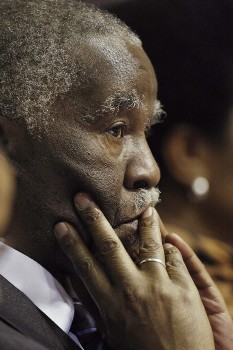African Union panel on Darfur postpones visit to Sudan
March 28, 2009 (KHARTOUM) – A high level panel established by the African Union (AU) last month look into accountability issues relating to Darfur rescheduled its first visit to the second week of April.

The SMC reported that the panel will meet with Sudanese president Omer Hassan Al-Bashir and other officials in Khartoum and Darfur as well as civil society groups.
The eight-member panel is comprised of three former African heads of state including South Africa’s Thabo Mbeki, Burundi’s Pierre Buyoya and Nigeria’s General Abu Salam Abu-Bakr.
Other members of the panel include Director of African Rights Rakiya Abdullahi Omar from Somalia, former minister Tiéblé Dramé from Mali, Special Envoy of former President Olusegun Obasanjo on the Trial of suspects of war crimes and human rights violations in Darfur Al-Hajji Mohammed from Nigeria, Judge Florence Mumba from Zambia, and former Foreign Minister of Egypt Ahmed Maher.
In mid-March the panel held its first meeting in the Ethiopian capital Addis Ababa.
The AU acting chairperson Elizabeth Tankeu at the meeting accused the international community and the UNSC of lacking appropriate understanding on issues concerning Darfur and demonstrated ignorance about the ongoing peace process.
“The international community should have a better understanding the situation on the ground, which may help in seeking appropriate solutions” she said.
The panel’s inauguration came almost two weeks after the International Criminal Court (ICC) issued an arrest warrant for Sudanese president Omer Hassan Al-Bashir on seven counts of war crimes and crimes against humanity, which include murder, rape and torture.
The AU criticized the warrant and urged the UN Security Council (UNSC) to invoke Article 16 of the ICC Statute that allows the council to suspend Bashir’s indictment for a period of twelve-months that can be renewed indefinitely.
However Western members of the council rejected any move to halt ICC proceedings despite visits last month by Arab and AU delegations. The panel is to submit a report on its findings to the AU summit next July.
The panel’s detailed mandate include coming up with a proposal for expediting the peace process in Darfur, advise the AU on how to face the challenge of dealing with war crimes and those who commit them and finding a way to achieve reconciliation among the Darfur warring parties.
Some critics have accused the panel of being nothing but an attempt to shield Al-Bashir from the ICC arrest warrant.
Mbeki has been one the main backers of Bashir following the announcement by the ICC prosecutor last July that he presented a case against Bashir to the judges.
But The South African leader defended the panel’s position saying that the AU Union “has taken the clear and unequivocal decision to ensure that where war does anyway break out, all belligerents must know that war crimes, crimes against humanity and other abuses will be punished resolutely, and that a culture of impunity will not be permitted to take root and entrench itself”.
He also said that his panel will not look into the ICC evidence gathered against the Sudanese president.
“It’s not in our mandate to assess the ICC or what it’s done” Mbeki told journalists.
Mbeki’s statements conflict with those made by AU commission chairman Jean Ping last August who said that the panel will look into “what the ICC did or did not do”.
Sudan has rejected any participation by African or foreign judges in its Darfur investigations and insisted that the panel will only review its judiciary system without conducting a full blown investigation.
In 2004 the UNSC formed a UN commission of inquiry to look into Darfur abuses headed by former President of the International Criminal Tribunal for the Former Yugoslavia (ICTY) Italian Antonio Cassese.
The commission concluded that the government did not pursue a policy of genocide in the Darfur region but that Khartoum and government-sponsored Arab militias known as the Janjaweed engaged in “widespread and systematic” abuse that may constitute crimes against humanity.
They further said that Sudanese judiciary is “is unable or unwilling” to prosecute those crimes and thus recommended referring the situation to the ICC.
The UNSC issued resolution 1593 under chapter VII in March 2005 referring the situation in Darfur to the ICC. At the time Tanzania and Benin voted in support of the resolution while Algeria abstained.
(ST)
